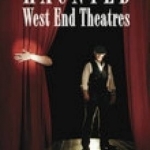Search
Search results

Haunted West End Theatres
Book
Take a trip behind the scenes of London's West End theatres to discover a spooky range of spectres...
TravelersWife4Life (31 KP) rated The Alamo Bride (Daughters of the Mayflower, #7) in Books
Feb 24, 2021
A Great book !
I got totally engrossed in this story and truly learned some new things ! It made me want to read the other books in this series that Barbour Publishing is putting out. This was such rich historical story it was like being there! Kathleen Y'Barbo really made history come alive in this book and it is filled with adventure.
While it was not my favorite book by Kathleen Y'Barbo it really was a great read and kept me interested throughout the whole book.
I give this book 4 out of 5 stars, for good history, lovely characters, and family focus.
I volunteered to read this book from Barbour Publishing in return for my honest opinion. The thoughts and opinions expressed within are my own.
I got totally engrossed in this story and truly learned some new things ! It made me want to read the other books in this series that Barbour Publishing is putting out. This was such rich historical story it was like being there! Kathleen Y'Barbo really made history come alive in this book and it is filled with adventure.
While it was not my favorite book by Kathleen Y'Barbo it really was a great read and kept me interested throughout the whole book.
I give this book 4 out of 5 stars, for good history, lovely characters, and family focus.
I volunteered to read this book from Barbour Publishing in return for my honest opinion. The thoughts and opinions expressed within are my own.
Jon Savage recommended Quadrophenia (1979) in Movies (curated)
Guillermo Del Toro recommended Spartacus (1960) in Movies (curated)
Guillermo Del Toro recommended Paths of Glory (1957) in Movies (curated)
Jonas Carpignano recommended Salvatore Giuliano (1962) in Movies (curated)
Michael Imperioli recommended Midnight Cowboy (1969) in Movies (curated)
Spectacular New Perspective
One of the greatest failures of our education system is its inability to make history interesting enough that people want to learn it so that we can stop repeating it. Then, we have Erik Larson. His brilliant writing technique turns dull historical facts into a story that forces you to continue turning the pages. Truly spectacular perspective of Churchill and those closest to him during a truly dark time in history. Also, a great glimpse of the German leaders as well. I'm truly looking forward to the next book of his I've ordered... and others after that. I think this should be a guide on how to bring history to a level that people can connect with.

Bitcoin Alpha - Bitcoin Trading with Calculator
Finance and Reference
App
Bitcoin Alpha allows all Bitcoin enthusiasts to keep up with the market, monitor trends, and stay on...

FundoBracelet
Lifestyle and Health & Fitness
App
Our division is a hands-on ring wearable integrated product applications and data services to...






